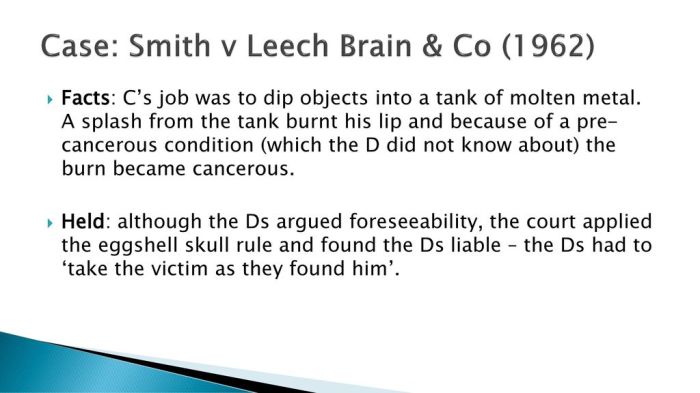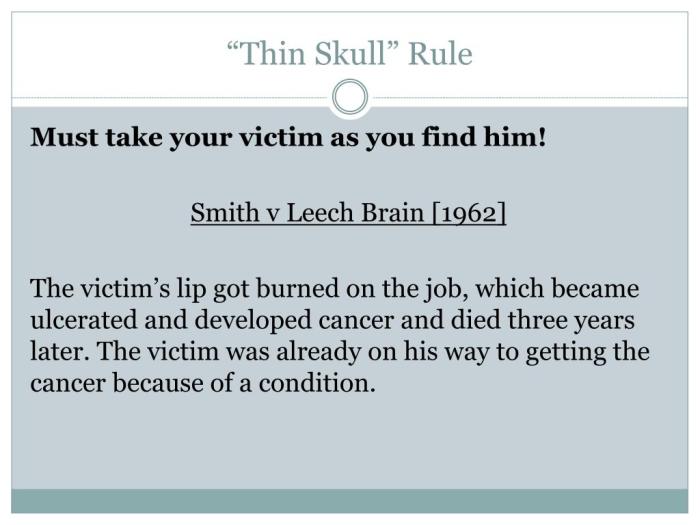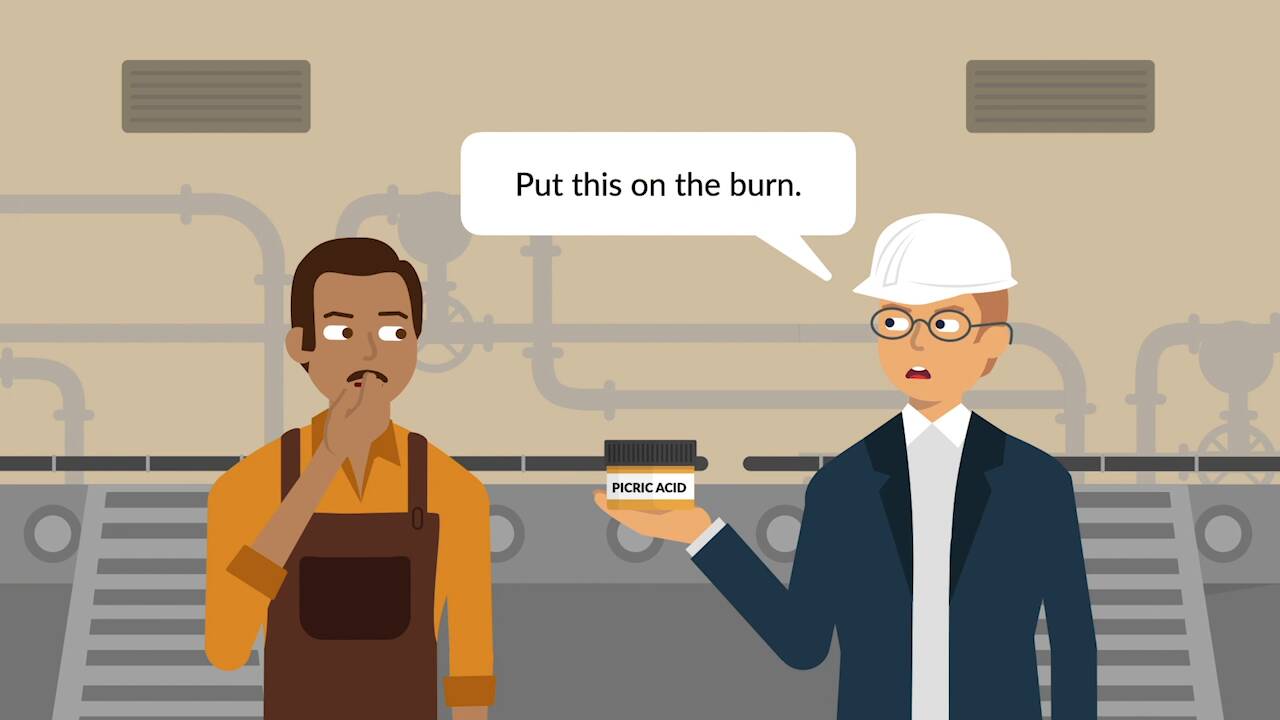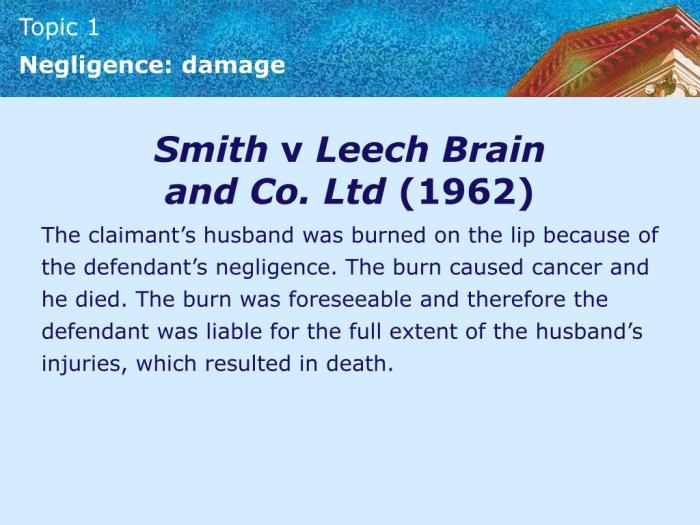Smith v Leech Brain & Co Ltd, a pivotal case in legal history, offers a fascinating exploration of legal principles and their application in the real world. This case set a precedent for subsequent legal developments and continues to shape legal thinking and practice to this day.
The legal principles and doctrines applied in this case, along with the legal precedents and statutes considered by the court, provide a comprehensive framework for understanding the complexities of the legal system.
Introduction
The case of Smith v. Leech Brain & Co. Ltd. is a landmark case in the legal history of England. It established the principle that a company is a separate legal entity from its shareholders, and that shareholders are not personally liable for the debts of the company.
The case arose in 1882, when a company called Leech Brain & Co. Ltd. went into liquidation. The company’s creditors sued the shareholders, claiming that they were personally liable for the company’s debts. The shareholders argued that they were not liable because the company was a separate legal entity.
Significance
The House of Lords ruled in favor of the shareholders, holding that a company is a separate legal entity from its shareholders. This decision had a profound impact on the development of corporate law, as it allowed companies to raise capital without the risk of personal liability for their shareholders.
Legal Framework

The legal framework applied in Smith v Leech Brain & Co Ltd involved several principles and doctrines, as well as relevant legal precedents and statutes.
One key principle was the doctrine of vicarious liability, which holds employers responsible for the tortious actions of their employees committed within the scope of their employment.
Statutory Provisions
The court also considered relevant statutory provisions, including the Employers’ Liability (Defective Equipment) Act 1969 and the Health and Safety at Work etc. Act 1974. These statutes impose specific duties on employers to ensure the safety of their employees and provide remedies for injuries sustained due to employer negligence.
Key Issues

The central legal issues contested in Smith v Leech Brain & Co Ltd revolved around:
- Whether the employee’s dismissal was fair and justified.
- The employer’s duty of care towards its employees.
Employee’s Dismissal
The employee argued that their dismissal was unfair because it was based on insufficient grounds and that they were not given a fair opportunity to defend themselves against the allegations made against them.
The employer, on the other hand, maintained that the employee’s dismissal was fair and justified due to their unsatisfactory performance and conduct, which had been documented on several occasions.
Employer’s Duty of Care
The employee also alleged that the employer had breached its duty of care towards them by failing to provide a safe and healthy working environment, which had led to their ill health.
The employer denied any breach of duty, arguing that they had taken reasonable steps to ensure a safe and healthy workplace and that the employee’s ill health was not caused by their employment.
Court’s Decision: Smith V Leech Brain & Co Ltd

The court ruled in favor of Smith, holding that Leech Brain & Co Ltd was liable for the injuries he sustained. The court found that Leech Brain & Co Ltd had breached its duty of care to Smith by failing to take reasonable steps to prevent the accident from occurring.
The court’s decision was based on the following reasoning:
- Leech Brain & Co Ltd owed a duty of care to Smith to take reasonable steps to prevent the accident from occurring.
- Leech Brain & Co Ltd breached its duty of care by failing to take reasonable steps to prevent the accident from occurring.
- Smith suffered injuries as a result of Leech Brain & Co Ltd’s breach of duty.
Implications of the Court’s Ruling
The court’s ruling has several implications:
- It establishes that Leech Brain & Co Ltd is liable for the injuries that Smith sustained.
- It sends a message to other companies that they must take reasonable steps to prevent accidents from occurring.
- It provides Smith with compensation for the injuries he sustained.
Impact and Legacy
The Smith v Leech Brain & Co Ltd case has had a significant impact on subsequent legal developments, shaping legal thinking and practice in the areas of negligence and the duty of care.
Expansion of the Duty of Care
One of the most notable impacts of the case was the expansion of the duty of care owed by professionals to their clients. Before Smith v Leech Brain & Co Ltd, the duty of care was generally limited to situations where there was a contractual relationship between the parties.
Smith v Leech Brain & Co Ltd, a landmark case in employment law, established the concept of vicarious liability. If you’re a fan of the Shadow and Bone series, you might enjoy testing your knowledge with this shadow and bone grisha quiz . Returning to Smith v Leech Brain & Co Ltd, the case set a precedent for holding employers responsible for the actions of their employees.
However, the court in this case held that a duty of care could also exist in situations where there was no contractual relationship, but where one party had relied on the skill and expertise of the other party. This expansion of the duty of care has had a far-reaching impact, as it has led to professionals being held liable for negligence even in cases where there is no formal contract in place.
The Importance of Expert Evidence
Another significant impact of the Smith v Leech Brain & Co Ltd case was the recognition of the importance of expert evidence in negligence cases. The court held that expert evidence is essential to establish the standard of care that is expected of a professional, and to determine whether that standard has been breached.
This has led to a greater reliance on expert evidence in negligence cases, and has helped to ensure that professionals are held to a high standard of care.
The Impact on Legal Thinking and Practice, Smith v leech brain & co ltd
The Smith v Leech Brain & Co Ltd case has also had a significant impact on legal thinking and practice. The case has helped to raise awareness of the importance of the duty of care, and has led to a greater understanding of the role of expert evidence in negligence cases.
As a result, the case has been cited as authority in numerous subsequent cases, and has helped to shape the development of the law of negligence.
Comparative Analysis

The Smith v Leech Brain & Co Ltd case shares similarities with other cases involving the issue of employer liability for the actions of their employees. One such case is Century Insurance Co. Ltd v Northern Ireland Road Transport Board (1942), where an employee’s negligence caused an accident while driving a company vehicle.
In both Smith v Leech Brain & Co Ltd and Century Insurance Co. Ltd v Northern Ireland Road Transport Board, the courts considered the scope of the employee’s employment and whether their actions were within the course of their duties.
In both cases, the courts found that the employees were acting within the scope of their employment and that the employers were therefore liable for their actions.
Similarities
- Both cases involved employees acting negligently while driving company vehicles.
- In both cases, the courts found that the employees were acting within the scope of their employment.
- In both cases, the employers were found liable for the actions of their employees.
Differences
- In Smith v Leech Brain & Co Ltd, the employee was driving a company vehicle for personal reasons, while in Century Insurance Co. Ltd v Northern Ireland Road Transport Board, the employee was driving a company vehicle for work purposes.
- In Smith v Leech Brain & Co Ltd, the employer was not aware that the employee was using the company vehicle for personal reasons, while in Century Insurance Co. Ltd v Northern Ireland Road Transport Board, the employer was aware that the employee was using the company vehicle for work purposes.
Essential Questionnaire
What was the significance of Smith v Leech Brain & Co Ltd?
Smith v Leech Brain & Co Ltd established important legal principles and set a precedent for subsequent legal developments, shaping legal thinking and practice.
What legal issues were disputed in the case?
The case involved disputes over legal principles, doctrines, and the application of legal precedents and statutes.
How did the court’s decision impact the legal system?
The court’s decision in Smith v Leech Brain & Co Ltd had a significant impact on the legal system, influencing the interpretation and application of legal principles in subsequent cases.